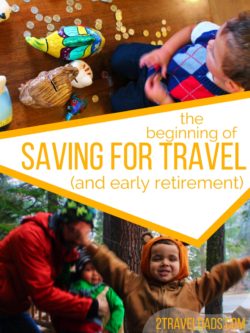Our notes here about saving for the future originally appeared on GaysWithKids.com, which is a great resource for families and same-sex couples looking to take the plunge into parenthood.
Recently, we saw some online promotion and hashtags around saving up for the future and just general thoughts on good practices with money. Chris and I started talking about life and how we’re set up for later on and we realized that we’re actually, without putting too much effort into it, on a good track. And now we’ve decided that it’s time to start intentionally doing a better job saving for the future and have some solid plans.
Since we travel a bunch, it would make sense that that’s one of the things we save for. We’re pretty conscious of this and actively make an effort to save for traveling with the kids. The other thing we’re saving for is retirement, but we’re changing that up real quick because we’ve been pretty passive about it. What else should we be saving for?
Note: we are not financial advisers and are only sharing what we’ve done through the years to save and have travel funds available. Talk to an actual certified financial planner if you get inspired to save for the future.
Teaching our kids to save
I’ll be the first one to tell you that we’re not going to go out and buy cars for our kids or jump on co-signing a credit card with them the day they move out and want to go have fun. What we ARE doing though is setting them up for success without them even knowing. From saving their little bits of money in piggy banks to having conversations with our Oldest about making quality purchases, we’re working to instill a sense of value and financial understanding as best as we can.
One of our New Year’s resolutions is to set up the kids’ own savings accounts with our bank. Why haven’t we done it yet? Because we always forget to bring their info with us when we are by our bank. No other reason. We just keep spacing it. 2017: the year of saving for the future… and really helping the kids build a framework for their own futures.
Note: a lot of banks offer special accounts for kids that don’t carry fees and have special rates in hopes of encouraging kids to save. Why not take advantage of that?
Saving for travel
 For so many people exciting travel seems like a complete pipe-dream. I recently read an article that made me chuckle because it said that travel isn’t accessible to everybody and we should all stop saying that it is. If you budget, research, save, plan and are responsible with money, travel is completely accessible. True, your dream of spending two months lying on a beach in Tahiti might not be feasible any time soon, but awesome weekend trips, road trips or not-too-distant beach holidays are attainable. Saving for the future can be travel related and doesn’t have to feel totally ridiculous or irresponsible.
For so many people exciting travel seems like a complete pipe-dream. I recently read an article that made me chuckle because it said that travel isn’t accessible to everybody and we should all stop saying that it is. If you budget, research, save, plan and are responsible with money, travel is completely accessible. True, your dream of spending two months lying on a beach in Tahiti might not be feasible any time soon, but awesome weekend trips, road trips or not-too-distant beach holidays are attainable. Saving for the future can be travel related and doesn’t have to feel totally ridiculous or irresponsible.
We have an account that’s for travel expenses and what goes into it is any sort of bonus income we get that’s not already earmarked for a project or known expense. A good example would be our tax refund, which usually gives us a substantial boost in this account. If you only have your 9-5 job this exact concept might not work perfectly for you, but a lot of peeps we know have some other random sort of income, from teaching fitness classes to woodworking.
Disclaimer: I make money from writing and photography which we consider a bonus since my actual job is being a stay-at-home-parent. This is HUGE help in saving for travel, but it’s not the only way we fund it. Also, we do let cost and traveling planning guide our saving and travel decisions.
 Another way we’ve been able to save for travel in the past has been with stock grants through our employers. True, the nature of stock grants is for long term investing and building wealth, but when you’re young and not terribly concerned about the big picture and find great value in the experience of travel, exercising stock options may be an idea to fund your adventures.
Another way we’ve been able to save for travel in the past has been with stock grants through our employers. True, the nature of stock grants is for long term investing and building wealth, but when you’re young and not terribly concerned about the big picture and find great value in the experience of travel, exercising stock options may be an idea to fund your adventures.
Note: we’re not saying to shift what you’ve been saving for the future to be able to go drinking in Cancun, but just that employer stock programs are an option for funding life-changing travels and expanding your horizons.
One other thing we’ve been able to leverage for making our travel more affordable has been our credit card points. I say “points” and not miles because every bank is different and ours offers a point system that is REALLY flexible. It’s been a lifesaver for booking travel!
Tip: another thing you need to be conscious of is saving money when traveling. In addition to saving for travel, you need to be smart about what you’re spending when you’re actually out exploring the world. Just sayin’… Our friend Alice of Teacake Travels has some good tips too!
Saving for early retirement
 Life is about so much more than working. Yes, having a career/job is important and it’s how you secure your future and ensure that you’ll be able to live independently from your kids, but in the meantime it’s such a bummer, even when you love your work. We’ve only recently started thinking about what it would be like to be able to fully enjoy life without being obligated to an employer or needing to work to pay bills.
Life is about so much more than working. Yes, having a career/job is important and it’s how you secure your future and ensure that you’ll be able to live independently from your kids, but in the meantime it’s such a bummer, even when you love your work. We’ve only recently started thinking about what it would be like to be able to fully enjoy life without being obligated to an employer or needing to work to pay bills.
Once this thought popped into our heads it’s not been easily shaken. So, here’s what we’ve done so far:
Reviewed our 401K savings and looked at their distribution
Reviewed what stocks we have from employer grants over the years (that we didn’t cash out)
Found a highly recommended financial adviser locally that we can meet with. This is the big step we’re looking forward to.
 We’ve also started talking about our goals regarding when we’d like to retire. For me, I’m basically retired already because I get to be a stay-at-home-dad, but Chris works really hard for our family at a desk job. We would love to be able to officially retire before 60, but have no clue how to make that dream happen. Saving for the future is all of the sudden crazy important to us once we realized how quickly time is passing.
We’ve also started talking about our goals regarding when we’d like to retire. For me, I’m basically retired already because I get to be a stay-at-home-dad, but Chris works really hard for our family at a desk job. We would love to be able to officially retire before 60, but have no clue how to make that dream happen. Saving for the future is all of the sudden crazy important to us once we realized how quickly time is passing.
We want to be the parents who are there for their adult children. We want to be able to be grandparents that are present and available to enjoy the family we’ve spent our lives building. If we can retire early, hooray! We’ll be able to be those old guys that get to tote their grandkids around or even show up unannounced at our kids’ houses to BBQ.
FYI: we have no clue as of yet how much we need to be able to retire, so that’s the first thing we’re going to evaluate with our planner when we meet in a few weeks. Can’t wait!
Creating a savings cushion
 Again, this is something that for so many is a dream in the distance but it’s doable for a lot of people. And what exactly do I mean by a “savings cushion?” I mean something that is actually sitting in a savings account and is accessible in an emergency, whether that be the unplanned ridiculous home or car repair or having to travel far to take care of an ailing family member. A cushion is what you need when you can feel your world starting to slip a bit.
Again, this is something that for so many is a dream in the distance but it’s doable for a lot of people. And what exactly do I mean by a “savings cushion?” I mean something that is actually sitting in a savings account and is accessible in an emergency, whether that be the unplanned ridiculous home or car repair or having to travel far to take care of an ailing family member. A cushion is what you need when you can feel your world starting to slip a bit.
How do you do this? Squirreling away a little bit here and there really adds up over time. When I say a “little bit” I truly mean a small amount. One man’s change is another man’s fortune, right? Well, here are some ways you can hide that money away and then someday have a nice surprise or even a small safety net.
Ad Hoc / obvious savings
I’m calling this “ad hoc” because it’s just that. They’re spur of the moment or blatantly visible savings options that will do the trick of saving with nothing complex about them. These are what we use as our rainy day funds.
Piggy banks for tangible money (cash or change that’s floating around) – it does work.
Taking out an extra $10 or so when at the grocery store and the teller asks “Cash back?” and then putting that someplace out of sight.
Available options
 These are savings resources that a lot of people have available to them but they might not take advantage of or realize the full benefit of.
These are savings resources that a lot of people have available to them but they might not take advantage of or realize the full benefit of.
“Keep the change” debit transfers where the bank puts a little into savings with each transaction
Health Savings Account – I am listing this because the pre-tax dollars are a “big picture” savings and then when a medical emergency or routine expense comes up, you’re not pulling from your travel fund or doing a 401K loan.
Employer stock programs – if your employer offers it, you may be able to put away a small percentage of each paycheck towards purchasing company stock at a discounted price. This is great because it typically is done quarterly and with minimal restrictions or tax penalties.
So, a lot of our plans, thoughts and advice (if you can call it that) are pretty high level. Everybody has a different financial situation, but even the smallest amount of saving will grow over time and when you see the growth you can feel encouraged to go deeper into saving for the future. If we learn anything new or have any huge breakthroughs in how to teach kids about money, believe me that we’ll share them ASAP. It’s another part of parenting that’s changing every day and we’re navigating for the first time. Happy saving!!





Love all of these suggestions! In our house growing up we received a weekly allowance…but it wasn’t tied to doing chores. We just had to do those because we were a part of the household lol. The allowance was the tool my parents used to teach us about money and budgeting. So when we were 5 we got our first allowance…it was $1.00. We had 3 jars in our room and we put 8 dimes into a jar for spending as we pleased. 1 dime went in a jar to give away to the charity/non-profit of our choosing and the last dime went into a jar for saving. As we got older the amount of our allowance increased but so did what we were responsible for purchasing. So while it might seem odd that by 2nd grade I was “responsible” to buy my own lunch at school once a week the reality is that they just worked the cost into our allowance…but it taught us about getting money and saving it for upcoming expenses. Now I am truly grateful for those lessons because I feel very confident about money management!
Awesome! We haven’t started allowances yet because we haven’t… But for Oliver, our oldest, I think it’s a good time to start. 🙂
Great post. I especially liked the part of teaching children to save and when you said: “..we’re working to instill a sense of value “. It reminded me of this wise quote: “Do not educate your children to be rich. Educate them to be happy. So when they grow up, they’ll know the value of things, not the price”.
Saving is a necessity, especially if you dream of a comfortable and early retirement. Inculcating the saving habit in Children is really very important, as you have mentioned. The kids need to understand the value of money at an early age and also start appreciating the benefits of savings. Nice article on an important topic.
Great tips! Those keep the change allowances work pretty well all the way around, for everyone. The fact that you are addressing this before you want it to happen, you will make it happen! You are offering great advice for your kiddos and they will thank you.
Great tips! Been saving all our lives too, both taught early to be mindful of money. We rather spend on travel and gear rather than clothes or nightlife. And every penny counts – cooking home, limiting restaurants (though we do splurge for anniversaries or birthday, Michelin-rated places!), and in general trying to find deals.